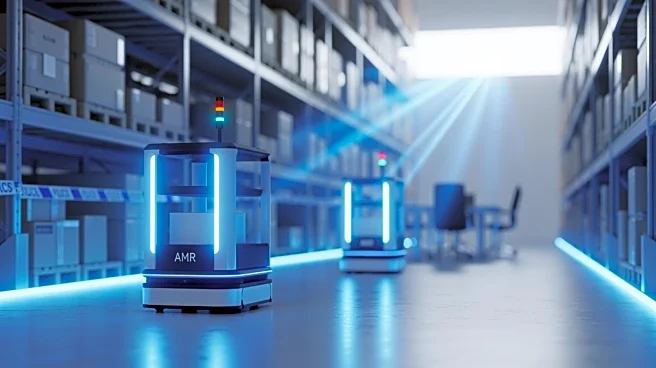What's Happening?
Locus Robotics is enhancing warehouse automation through its autonomous mobile robots (AMRs) equipped with domain-specific artificial intelligence. Hamid Montazeri, Senior Vice President of Software and AI at Locus Robotics, emphasizes the importance
of 'physical AI' in transforming AMRs into adaptive systems capable of real-time reasoning in dynamic environments. Unlike general-purpose robots, these AMRs are designed specifically for logistics, optimizing productivity and adapting to changing workflows. The company is focusing on software innovation to unlock new levels of performance and scalability, addressing labor shortages and supply chain pressures with targeted automation solutions.
Why It's Important?
The development of domain-specific AI models in AMRs represents a significant shift in warehouse automation, offering faster and more cost-effective solutions compared to generic models. This approach is crucial for companies facing labor shortages and supply chain challenges, as it provides immediate, measurable benefits and enhances operational efficiency. By prioritizing automation, businesses can build more resilient and agile supply chains, positioning themselves for long-term success in a competitive market. The advancements in AI-driven AMRs are expected to reshape the fulfillment industry, making operations faster, more efficient, and adaptable.
What's Next?
Locus Robotics anticipates breakthroughs in smart sensors and physical AI that will further enhance AMR capabilities. These advancements will improve environmental perception and task execution, leading to more versatile and intelligent fulfillment operations. As the company continues to innovate, it aims to expand the role of AMRs in warehouse automation, driving efficiency and adaptability in high-volume environments. The focus on software-driven solutions will likely influence investment strategies in robotics and AI, as businesses seek to integrate advanced technologies into their operations.
Beyond the Headlines
The shift towards domain-specific AI in warehouse automation raises ethical and strategic considerations for businesses. As companies invest in targeted automation, they must balance technological advancements with workforce implications, ensuring that automation complements human labor rather than replacing it. Additionally, the integration of AI-driven systems requires careful management of data privacy and security, as well as ongoing training and support for employees adapting to new technologies.
















